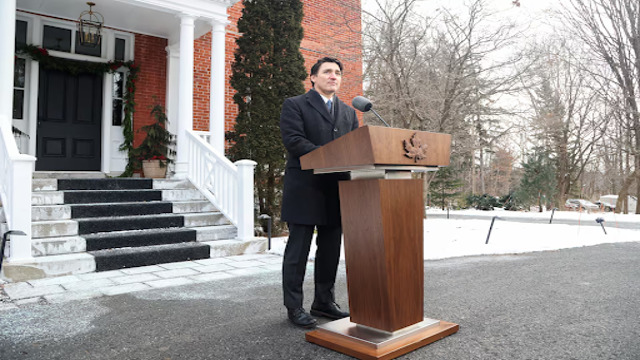
Canadian Prime Minister Justin Trudeau announced his decision to step down as leader of the Liberal Party but will remain in office until a new leader is selected. Speaking from his residence at Rideau Cottage in Ottawa on January 6, 2025, Trudeau addressed reporters, outlining his plan to ensure a smooth transition of leadership while continuing his duties as prime minister. Reuters
Canadian Prime Minister Justin Trudeau announced on Monday his decision to step down after nearly a decade in power, citing internal party conflicts and declining public support as key reasons. Speaking from his residence, Trudeau expressed his commitment to staying in office until a new leader is chosen to ensure a smooth transition.
“This country deserves a real choice in the next election, and it has become clear to me that if I'm having to fight internal battles, I cannot be the best option in that election,” Trudeau said. The Liberal Party is expected to initiate a leadership race soon, with the new leader assuming the role of prime minister and leading the party into the next federal election.
Trudeau’s tenure began in 2015 with a wave of optimism and promises of progressive policies. Known for championing gender parity and climate initiatives, he earned international recognition as a prominent progressive leader. However, his popularity waned in recent years as Canadians faced rising housing costs and inflation. A December poll showed the Liberals trailing significantly behind the Conservatives, with 45% of voters favoring the opposition.
The announcement comes after weeks of mounting pressure within the Liberal Party. Discontent reached a tipping point when Finance Minister Chrystia Freeland resigned, accusing Trudeau of prioritizing “political gimmicks” over effective governance. This followed two significant by-election losses and growing dissatisfaction among Liberal lawmakers.
As part of the transition, Trudeau announced the suspension of parliament until March 24. This move delays a potential non-confidence vote from opposition parties, pushing the earliest possible election to May. While this provides the Liberals time to regroup, some experts argue it could alienate voters eager for change.
Political analyst Shachi Kurl likened Trudeau’s situation to a “fatigue factor,” stating, “This is a government in its 10th year – at some point, the milk just expires.” Philippe Lagasse, a constitutional expert, added that proroguing parliament might frustrate voters who are ready for an election.
Trudeau’s leadership struggles have also raised concerns among business leaders and provincial premiers, particularly with the looming threat of tariffs from the incoming U.S. administration. Ontario Premier Doug Ford called for stability, urging the federal government to address these economic challenges.
Potential candidates to replace Trudeau include former Finance Minister Chrystia Freeland and ex-central banker Mark Carney, both of whom thanked Trudeau for his service but remained non-committal about their intentions.
Meanwhile, Conservative leader Pierre Poilievre criticized the Liberals’ internal chaos, calling for an immediate election. Poilievre, who gained prominence during anti-vaccine mandate protests, accused the Liberals of neglecting the country’s needs during a crucial time.
Trudeau’s decision marks the end of an era for the Liberals, as they face an uphill battle to regain public trust and overcome internal divisions ahead of the next election.















